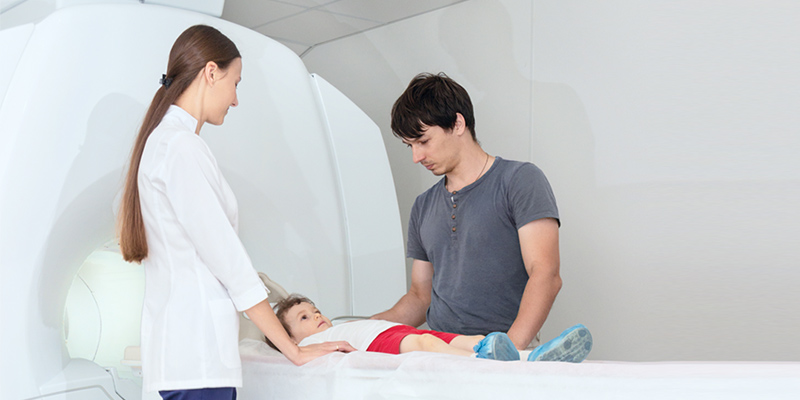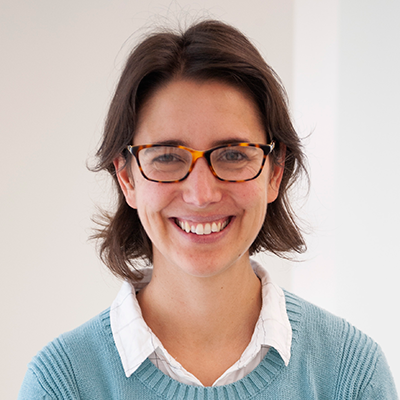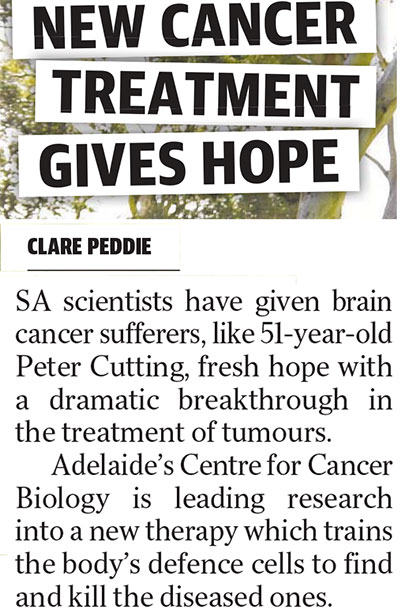New hope for childhood brain cancer
 HEALTH
HEALTHLocal scientists are close to introducing a new therapy for childhood brain cancer in a world-first that would give hope to many kids and their families.

CAR T-cell therapy involves using a patient’s own cancer-fighting T-cells, genetically engineering them in the lab with Chimeric Antigen Receptors (CAR), and then returning them to the patient in the hope they can attack the cancer.
Centre for Cancer Biology (CCB) Research Officer Dr Tessa Gargett is leading the work. CCB is an alliance between UniSA and SA Pathology.
“There’s a really rare brain cancer called diffuse midline glioma that only affects kids,” Dr Gargett says. “It is inoperable because of where it’s located – it’s right in the middle of their brain so they can’t have surgery. They can have some radiotherapy, but it doesn’t really prolong their life at all. It is sadly a death sentence for these kids.
 The Advertiser, 2 July 2020
The Advertiser, 2 July 2020“They often get diagnosed about two or three years old, which is really devastating for their families. A lot of the parents and carers say that the thing that upsets them the most is that they don’t have a lot of treatment options.
“So we’ve had to come up with a trial that would be something new, something that hasn’t been tested before and that will bring hope to these families.”
The Hospital Research Foundation (THRF) is funding the last stage of testing for this new breakthrough treatment, to ensure it is safe to be given to patients, possibly as early as next year.
CAR T-cell therapy has shown to be successful in children with leukaemia, and research teams globally are now seeing if it will work in other types of cancer such as melanoma and breast cancer. Dr Gargett and her collaborators in Sydney and Stanford Medicine in the US are one of the only groups trying it in childhood brain cancer.
“We can genetically engineer a patient’s own white blood cells, which are responsible for fighting off infection,” Dr Gargett says. “We do this by introducing some new DNA, and that allows them to recognise the tumour cells.
“The idea is that they find their way into the brain, find the tumour cells, bind to them and start killing them.
“The challenge is we need them to only attack the tumour cells and not the healthy brain cells. But our initial safety testing in the lab looks good, they are distinguishing between a tumour cell and say a neurone, so that’s given us the confidence to go forward.”
The last stage of preclinical testing is being undertaken with funds from THRF – a crucial step in order to gain approval from the Therapeutic Goods Administration to run clinical trials with patients at Sydney Children’s Hospital, where Dr Gargett is collaborating.
There is also a trial in adult brain cancer patients planned at the Royal Adelaide Hospital.
Senior Paediatric Oncologist at Sydney Children’s Hospital, Associate Professor David Ziegler, this month secured a $1.1 million grant from the Federal Government to run these world-first clinical trials, once ready.
“We are so grateful to THRF supporters who have enabled us to receive this grant – we see this as bridging funding to help us get over this last hurdle to clinical trials,” says Dr Gargett.
“To nearly be at the stage where we can take our work in the lab and apply it to real patients, that’s very rewarding.”
UniSA cancer experts partner with researchers locally and globally to develop cancer treatments, cures and advanced diagnostics. You can support their efforts by donating via the UniSA Cancer Research Fund website. All funds raised go directly to their research.
Other Stories
- New hope for childhood brain cancer
- Researchers pioneer early diagnostic tool for Parkinson's disease
- UniSA: young and on the rise
- UniSA to lead world first observatory to measure the psychosocial safety climate of workplaces
- From the Vice Chancellor
- Achievements and Announcements
- Your commuter coffee made sustainable thanks to SA industry partnership
- Thinking about working from home long-term? 3 ways it could be good or bad for your health
- Video: Enterprise25 – building on our past achievements
- National approach needed to enable teachers to identify harmful sexual behaviours by children
- Architecture in an age of augmented reality
- Seven South Australian startups forging ahead with innovative ideas
- Locked down and liquored up? UniSA research reveals the truth about Australians’ drinking during COVID-19
- The latest books from UniSA researchers
- In Pictures: Working and studying from home highlights reel




